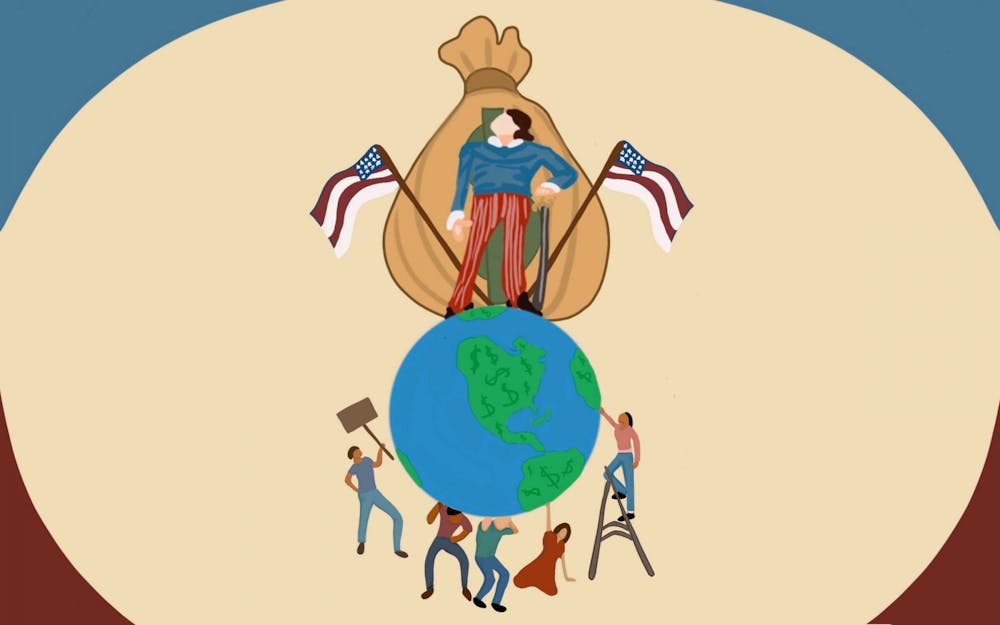A recent opinion column in the IDS seeks to make a distinction between capitalism and the free market. My colleague critiques the former while praising the latter. It’s amusing that anti-capitalist rhetoric has become so popular that the capitalists themselves are getting in on it. Because as much as he may distance himself from capitalism, he is ardently advocating for the worst version of it.
He defines capitalism as consisting of “private ownership of production,” “accumulation of profit and capital” and then, bizarrely, “the creation of a powerful ruling class,” as if a powerful ruling class wasn’t already necessary for capitalism to exist in the first place.
He says “free market economics” is something not just different, but preferable.
Related: Our free-market economy is better off without capitalism
He writes that capitalists have “hijacked” the market economy. Capitalism, he rightly claims, has concentrated power “in the hands of the few,” but the free market, he wrongly claims, has brought democracy to the economy.
The truth is that the free market he writes so glowingly of is just a fantastical version of capitalism that has never actually existed. Capitalism exists in degrees — thankfully there has never been a market “free” from government regulation, only markets varying in degrees of regulation.
But a free market, or any other variation of capitalism, is incompatible with democracy.
My colleague wishes for an “unhampered market economy.” Yet, we should be glad this doesn’t exist. Were it not for the visible hand of government, the invisible hand of the market would strangle us all.
Take food for example. The capitalists have commodified a basic human need, and when the market was freer, they didn’t even have the decency to ensure it was safe to consume. Hence, the Food and Drug Administration was designed to protect consumers from predatory capitalists.
My colleague points out the hypocrisy of the capitalists who criticize government intervention while also benefiting from it. He’s right to do so.
But if he thinks the free market could survive without that intervention, he’s mistaken. After all, who upholds property rights?
Even when the state regulates the economy, these are only concessions, granted to the workers so they won’t revolt against private property. It appears that the state is taking the side of the workers over the capitalists, but the state is only appeasing them.
Though perhaps my colleague isn’t so foolish as to be anti-state. Perhaps he believes the government ought to exist, if only to protect property rights.
Also: A world to win: What it means to be a young, American socialist
In an economic system based upon private ownership, democracy is impossible. Democracy demands social equality. In a free market, the owner of capital, with the power of the state, has control over the worker; there is no equality between them. The free market has no solution for class struggle, and thus there is no democracy.
My colleague says a free market would not be biased toward capital owners. He claims the market “functions best when wealth and money flow like water and circulate through the whole society. A natural redistribution of wealth occurs without the government having to force it.”
This is nonsense. The wallets of the proletariat during any time in history attest to this.
All work in the “free” market is coercive. If the worker doesn’t sell their labor to the capitalist, they will starve. The worker must do this, regardless of wages or work conditions in most cases. If the workers try to combine forces in order to improve wages or conditions, they are often met with fierce resistance from the capitalists.
These conditions cannot provide the “equality of opportunity” that my colleague says is necessary for a functioning free market.
If my colleague cares for democracy, then surely he will soon see that it can only exist when the workers own the means of production in common. He says this would have a place in a market economy. He allows the democratic workplace as an exception, but democracy can only exist when it is the rule.
Jared Quigg (he/him) is a sophomore studying journalism and political science.






